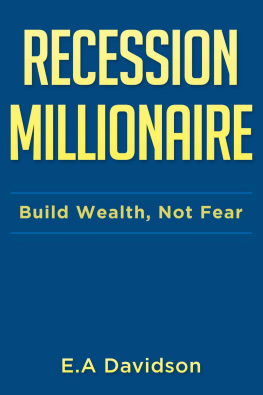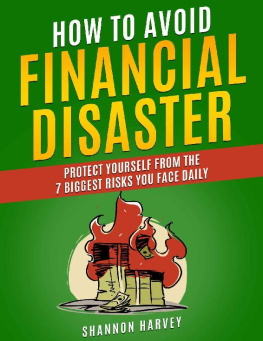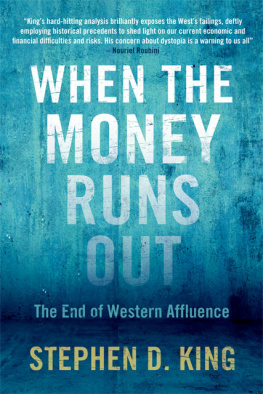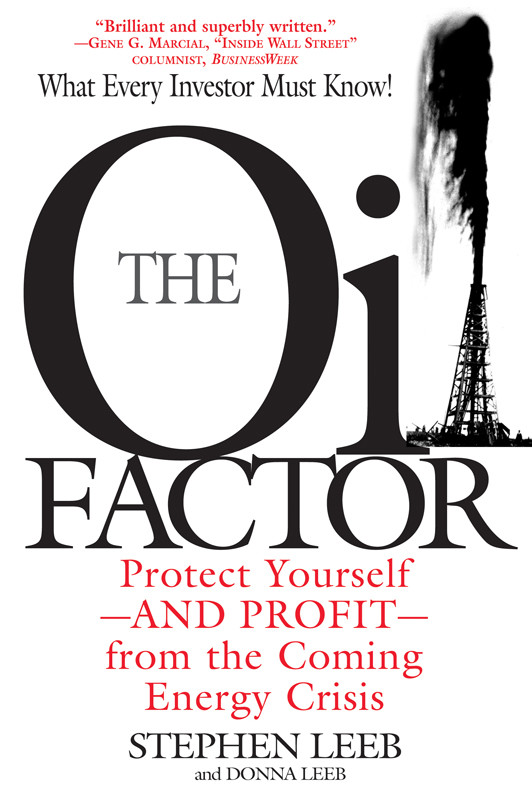Copyright 2004 by Stephen Leeb and Donna Leeb
All rights reserved
Warner Books
Hachette Book Group
237 Park Avenue, New York, NY 10017.
Visit our website at www.HachetteBookGroup.com.
The Warner Books name and logo are trademarks of Hachette Book Group, Inc.
ISBN: 978-0-7595-0981-8
First eBook Edition: February 2004
also by Stephen Leeb and Donna Leeb
Getting in on the Ground Floor
Defying the Market
by Stephen Leeb and Roger Conrad
Market Timing for the Nineties
The Agile Investor
To Tim and Will
We gratefully acknowledge the hard work and contributions of Genia Turanova and Toby Crabtree in helping research stocks and funds. Equal thanks to Steve Kizer for the charts and tables.
We are thankful that we were lucky enough to link up with our proleptic editor Rick Horgan, who believed in this project from the beginning and whose astute comments and questions continually steered us in the right direction.
As always, were grateful to Al Zuckerman, our agent at Writers House, who kept pushing us to make the proposal better.
Finally, we want to thank everyone at Leeb Capital Management and Leeb Brokerage Services for being such hard workers as well as such great people. There are too many of you to mention everyone individually, but we truly appreciate all of you. We cant not mention Steve Fishman for handling pretty much everything; Bob Lehr for his friendship and always astute advice; Steve Perkins and Wade Black for their strong support; and Burt Dorsett for his valuable understanding of markets. Finally, thanks to Regina Fishman, Jim Rutz, and Peter Bohning.
Oil in the 1990s (figure 1a)
Oil Prices and the S&P 500 (figure 2a)
Following Oil vs. Holding the S&P 500 (figure 2b)
Oils Buy and Sell Signals (figure 2c)
Our Ongoing Oil Habit (figure 2d)
Declining Domestic Oil Production (figure 3a)
Declining Saudi GDP (figure 3b)
Real Oil Prices, 1949-2002 (figure 4a)
Debt as Percentage of GDP (figure 5a)
Soaring Bankruptcy Petitions (figure 5b)
Mortgage Debt Outstanding (figure 5c)
Natural Gas Prices (figure 6a)
Government Spending and the CPI,
1901-2002 (figure 8a)
Energy and Inflation (figure 9a)
Inverse Relationship (figure 9b)
Inflation and Markets (figure 10a)
Sailing Through the 1970s (figure 10b)
Silver (figure 13a)
Palladium (figure 13b)
Defense Expenditures (figure 14a)
Weather-Related Woes (figure 15a)
Bonds in the Depression (figure 17a)
Defying the Market Portfolio Performance (figure 18a)
Model Portfolios (figure 18b)
I nvesting is a tough business, whether you do it simply for your own account or professionally. And one of the toughest things about it is that there is so much information out there that conceivably can bear upon your decisions. To be a savvy investor, theres nothing that isnt relevant, from science to economics to international relations to politics in Washington. It all bears upon the economy, upon the financial markets, and upon prospects for individual stocks. Whew!
As we said, this makes it toughbut it also makes it wonderfully fascinating and fulfilling, because if you take it seriously, it plunges you into the whole wide world of knowledge. As part and parcel of our investment responsibilities, we devour not just daily newspapers and the basic financial publications but also a slew of science, technology, medical, and political magazines and journals, not to mention books and, now, Internet articles.
Then, of course, the task becomes one of paring down and synthesizing. Most of the information we absorb is interesting, but not all of it is equally useful. Knowing how to evaluate what you read, and how to draw together disparate threads of information and apply them to prospects for the financial markets, is the real challenge. But its also what we really love to do.
Since weve been in this business, for over a quarter of a century, weve always been drawn to trying to see the big picture. Its like those digitally created picture puzzles that were popular a few years back. When you first look at a page, its just a collection of colors and dots. If you peer a little longer, though, and relax your eyes in just the right way, suddenly a three-dimensional image emerges. When it comes to the investment picture, we want to avoid being overwhelmed by the dots. We want to see what lies behind themwhat they add up to.
In our first book, Getting in on the Ground Floor, the big-picture trend we saw was declining inflation. We understood that low inflation is what makes it possible for the economy to sustain growth and that prospects of sustainable economic growth are what lead to bull markets. Thus we predicted that the market was about to enter a long-term bull phase that would carry the Dow to above 4000. We began writing the book in 1984 when the Dow was a bit above 1000, and many people thought we were nuts.
Our most recent book before this one, Defying the Market: Profiting in the Turbulent Post-Technology Market Boom, also was a big-picture type of effort. We wrote it in 1998, as the tech boom was really gathering steam, and it was published in midsummer 1999. The key trend we identified was thatcontrary to what almost everyone else thoughttechnological progress was slowing down. As a result, we warned the tech boom wasnt sustainable. Half a year later, the tech boom turned into a bust.
One reason why we gravitate to the big picture is that it enables us to offer the best investment advice we can. In Defying the Market, we used our big-picture insights to construct a model portfolio. We recommended specific stocks and specific allocationsno fudging. For the four-year period after the book came out, our recommendations rose by some 10 percent, compared to a loss of nearly 30 percent in the S&P 500. That hefty outperformance resulted from our insight into the big picture, an understanding of what was really important in the overall investment scheme of things.
This book, The Oil Factor, is another big-picture book, and we think its our most important one yet. The underlying trend it deals with relates to energy, which is as essential to our economy and society as food is to our bodies. In the pages ahead we explain why we think we are on the cusp of a major transition that, revolving around oil, will dominate the investment picture for many years to come. And we tell investors exactly how they best can deal with this challenging new environment so as to come out winners. We hope you find it provocative, informative, and helpful.
A t various moments in the past thirty-plus years, oil has thrust itself front and center into our consciousness. The first oil shock came during the Arab oil embargo of 1973, when oil prices rose precipitously and filling up our tanks at the local gas station became a major ordeal. A few years later during the revolution in Iran, and then in 1991 prior to the first Gulf War, prices also soared. During these times, everyone fretted about oil.
When oil prices came down, though, as they always seemed to do, most of us once again were happy to take oil for granted. Yes, we knew it was a finite resource that eventually would run downbut surely that day was a long way off. And yes, we had become dependent on an unstable and often hostile part of the world, the Middle East, to supply us with the lifeblood of our economybut surely it was in those countries interests to continue to do so.
During those years, numerous Cassandras (and remember, while the term Cassandra is often used in a derisively negative way, the original prophetess of that name was absolutely on target in her gloomy rantings), including President Jimmy Carter, warned that the U.S. needed to begin planning sooner rather than later for the day when oil would become less available/wildly expensive. Many were motivated by environmental and geopolitical concerns as well as by the realization that at some point the oil we needed simply wouldnt be there.







